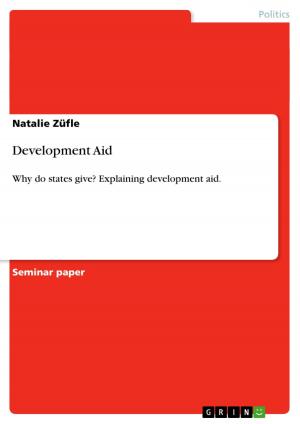Is the rise of radical Islam a response to authoritarian rule?
Nonfiction, Social & Cultural Studies, Political Science| Author: | Ilona Ilma Ilyes | ISBN: | 9783640690442 |
| Publisher: | GRIN Publishing | Publication: | August 27, 2010 |
| Imprint: | GRIN Publishing | Language: | English |
| Author: | Ilona Ilma Ilyes |
| ISBN: | 9783640690442 |
| Publisher: | GRIN Publishing |
| Publication: | August 27, 2010 |
| Imprint: | GRIN Publishing |
| Language: | English |
Essay from the year 2010 in the subject Politics - International Politics - Region: Russia, Central European University Budapest, course: Internationale Relationen, language: English, abstract: This paper is going to address the question whether the rise of radical Islam is a response to the authoritarian rule in the North Caucasus. I will argue that radical Islam emerged as a response to the authoritarian rule and as a resisting force to the Russian intervention and repression in the North Caucasus, but for its rise and evolution a determinative role was played by the global rise of Islamic extremism. Authoritarianism and repression were a triggering point for the propagation of the radical groups that turned to violence and terrorist attacks with the concrete aim to replace the authoritarian system and change the regime creating a state based on Islamic rule. This process of radicalization was facilitated by the religious, social, political, economic conditions in the North Caucasian regions that created a fertile ground for the spread of radical Islamic ideas. The paper will start with a brief overview of Islam in the North Caucasus. Secondly, short description about the ideological foundations of radical Islam will be introduced. The main factors that advanced the radicalization of Islam in the North Caucasus, with the special focus on the economic, political, social conditions and the spread of violence and repression will be indicated in the third section of the paper. Fourth, the analysis of the internal causes that contributed to the rise of radical Islam will demonstrate that the emergence of radical Islam can be considered as a response to the authoritarian rule. Turning than to the review of the external factors I will conclude that the rise of radical Islam is part of a wider Islamic revival worldwide.
Essay from the year 2010 in the subject Politics - International Politics - Region: Russia, Central European University Budapest, course: Internationale Relationen, language: English, abstract: This paper is going to address the question whether the rise of radical Islam is a response to the authoritarian rule in the North Caucasus. I will argue that radical Islam emerged as a response to the authoritarian rule and as a resisting force to the Russian intervention and repression in the North Caucasus, but for its rise and evolution a determinative role was played by the global rise of Islamic extremism. Authoritarianism and repression were a triggering point for the propagation of the radical groups that turned to violence and terrorist attacks with the concrete aim to replace the authoritarian system and change the regime creating a state based on Islamic rule. This process of radicalization was facilitated by the religious, social, political, economic conditions in the North Caucasian regions that created a fertile ground for the spread of radical Islamic ideas. The paper will start with a brief overview of Islam in the North Caucasus. Secondly, short description about the ideological foundations of radical Islam will be introduced. The main factors that advanced the radicalization of Islam in the North Caucasus, with the special focus on the economic, political, social conditions and the spread of violence and repression will be indicated in the third section of the paper. Fourth, the analysis of the internal causes that contributed to the rise of radical Islam will demonstrate that the emergence of radical Islam can be considered as a response to the authoritarian rule. Turning than to the review of the external factors I will conclude that the rise of radical Islam is part of a wider Islamic revival worldwide.















